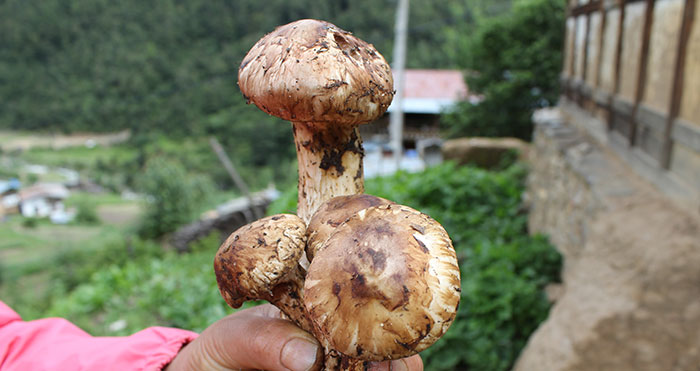Sustainable harvesting needed, says experts
Yeshey Lhadon
The Covid-19 pandemic has affected the Matsutake (Sangay Shamu) and the exotic medicinal mushroom, Cordyceps sinensis (Yartsa Goenbub) business, which otherwise would be peaking at this time of the year.
With export restricted or importers not showing up at auctions and prices not up to expectations, collectors are withdrawing from auctions. Many say the quality of both the fungi will deteriorate if stored for long. The declining productivity of these wild mushrooms has raised concern. These wild fungi could disappear from the woods because of overharvesting.
Should collectors stop harvesting the mushroom for a season and let it regenerate?
Mushroom specialist at the National Mushroom Center (NMC), Dawa Penjor, said that if people stopped collecting mushrooms, it would help the mushrooms regenerate. However, he said collecting mushrooms with moderation is good. “In the long run, the forests could become too thick and mushroom growth could be reduced if people don’t collect them,” he said.
Some pickers are harvesting the mushrooms before they are mature, leaving no spores for regeneration. Dawa Penjor said: “NMC encourages harvesters to practice sustainable harvesting method; protecting the substrate, soil, host plant and allowing some mushrooms to mature and shed spores.”
Matsutake is the main source of income for the people living in higher altitude. Kaden, a Matsutake collector from Genekha gewog in Thimphu, said that Matsutake once crowded the Genekha forests not so long ago. She said, “We find lesser mushrooms now a days but it fetches us better price. Our livelihood depends on the Matsutake yield.”
NMC train the mushroom harvesters every year on sustainable harvesting and marketing of wild mushrooms emphasising on Matsutake and its ecology. Matsutake can be harvested only within the declared time frame as per the standard set by NMC.
The mushroom harvesters were also provided standard baskets to discourage airtight containers such as plastic bags “Using baskets for collection and transportation of mushroom would allow spores to drop in the forest and maintain quality of mushroom,” said Dawa Penjor.
This year, however, there is only one exporter. Thus, Matsutake collectors from Genekha go to pick mushrooms only thrice a week. Dawa Penjor said that the limit on mushroom collection would allow mushrooms to flourish. He said, “Picking Matsutake three times a week is better for the mushroom.”
Passang Gyelmo, who collected mushrooms every day last year, can now only go when the exporters inform her to collect the mushrooms. She observed that some Matsutake had already opened its cap. She said, “I think we will have a better harvest next year. But if we are restricted from collecting mushrooms this year, the mushrooms will rot eventually and its economic value will deteriorate.”
This year, the collectors sell mushrooms in three grades—A, B, and C. “We now sell the grade B mushroom as grade C. The exporter is looking for perfect shapes,” said Passang.
The declining mushroom production is also attributed to increasing temperature and invasive species. The matsutake in Genekha grows in brown oak (Bji Shing) forest. “The blue pine creeping in the brown oak area is changing the flora composition, making the soil acidic and dry, affecting the mushroom forest if not controlled,” said Dawa Penjor.
The International Union for the Conservation of Nature (IUCN) recently declared that Cordyceps Sinensis is threatened with extinction because of overharvesting. Globally, overharvesting has slashed population by about 30 percent in the last 15 years. Bhutanese collectors are experiencing difficulties finding the fungus. Quality is another issue with collectors quick to blame climate change.
The head of IUCN’s Fungal Conservation Committee, Gregory Mueller was quoted saying “This is one of the few documented cases of a fungus being threatened by overharvesting.”
He said there needed to be a sustainable harvest programme to protect both the fungus and the communities that rely on it for their incomes.
Another mushroom sought after is the Chanterelle (Se sey shamu). Dawa Penjor said that most Chanterelle collectors were not highlanders and the collection was not critical. He said, “Overharvesting of Se sey Shamu is destroying the ecology too.”
He said that if people are stopped from harnessing the natural resources such as mushrooms, it could lead to the tragedy of commons. “If I don’t harvest the mushroom then my neighbour will harvest. Then why should I not?”
Asahi Shimbun, a Japanese newspaper, reported in July that the IUCN has listed Matsutake as a “vulnerable” species.


